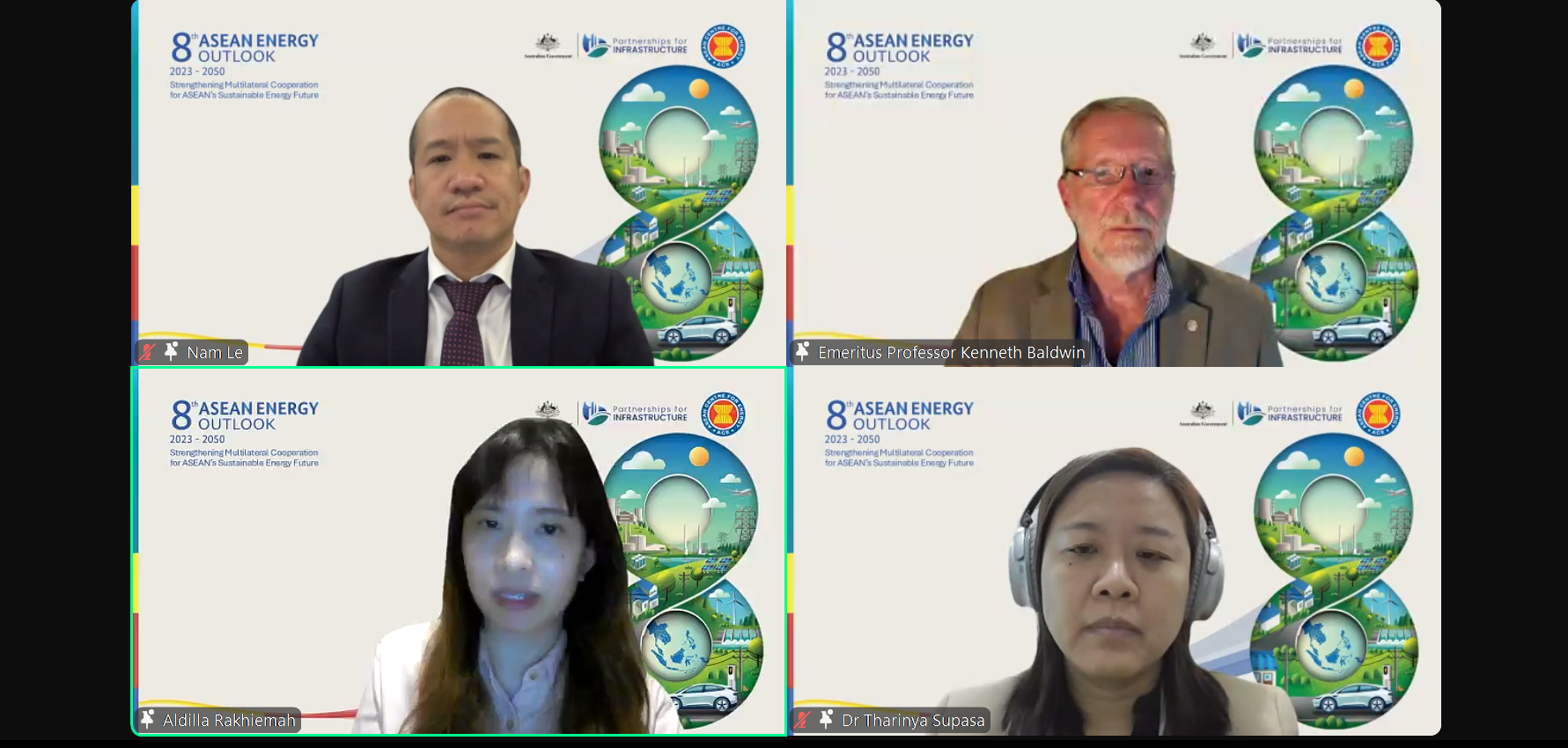Online, 25 November 2024

Photo 1. Group photo of the 8th ASEAN Energy Outlook 2nd Public Webinar panellists, featuring Beni Suryadi, Acting Executive Director of ACE (bottom); Emeritus Professor Kenneth Baldwin of Inaugural Director of ANU Energy Change Institute (middle-left); Rika Safrina, Senior Analyst of Energy Modelling and Policy Planning (MPP) Department of ACE (middle-centre); Dr Tharinya Supasa, Project Lead of Southeast Asia Energy Policy at Agora Energiewende (middle-right); Amira Bilqis, Analyst of MPP Department at ACE (top-left_; Aldilla Rakhiemah, Senior Research Analyst of ACCEPT at ACE (middle-centre); and Nam Le, Energy Lead of P4i (top-right).
On 25 November 2024, the ASEAN Climate Change and Energy Project (ACCEPT) participated in the 8th ASEAN Energy Outlook (AEO8) 2nd Public Webinar: “Strengthening Multilateral Cooperation for ASEAN’s Sustainable Energy Future”, hosted by the ASEAN Centre for Energy (ACE) in collaboration with Partnerships for Infrastructure (P4i). Following the launch of AEO8 during the 42nd ASEAN Ministers on Energy Meeting (AMEM) and Associated Meetings, this webinar series was established to disseminate and discuss the outlook’s key analysis and findings.
Aldilla Rakhiemah, Senior Research Analyst of ACCEPT, represented the team as a panellist of the session, alongside Emeritus Professor Kenneth Baldwin, Inaugural Director of ANU Energy Change Institute and Dr Tharinya Supasa, Project Lead of Southeast Asia Energy Policy at Agora Energiewende. Meanwhile, Nam Le, Energy Lead of P4i, led the webinar as the moderator.
ACCEPT, in support of the ASEAN Plan of Action for Energy Cooperation (APAEC) Phase II: 2021-2025, actively conducts capacity building, policy advocation, and knowledge dissemination activities to enhance the region’s capacity for a low-carbon economy as one of its main outcomes. In line with this commitment, the project contributed to the development of the AEO8, specifically in modelling one of the four scenarios presented in the document—the Carbon Neutrality Scenario (CNS).
During the session, Aldilla emphasises the important role of AEO8’s four scenarios—including CNS—in providing important insights on ASEAN’s energy landscape. With the current phase of the APAEC nearing its completion, these insights will be instrumental in developing the next phase of the regional energy blueprint. She further highlighted that the 42nd AMEM has already endorsed a theme for the next APAEC phase, “Advancing Regional Cooperation in Ensuring Energy Security and Accelerating Decarbonisation for a Just and Inclusive Energy Transition”, which ACCEPT actively supported in formulating.

Photo 2. Panellists of the webinar during the discussion
Aldilla elaborated on how the AEO8 underscores interconnectivity as a powerful tool to address risks and uncertainties in ASEAN’s energy landscape. She mentioned the ASEAN Power Grid (APG) as a notable example, a programme area under the APAEC that allows ASEAN Member States (AMS) to share resources, balance energy supply and demand, and reduce vulnerability to national-level disruptions. Moreover, she also underscored another APAEC programme area, the Trans-ASEAN Gas Pipeline (TAGP), and how it provides flexibility by enabling access to diverse energy sources across ASEAN countries.
The topic of interconnectivity further brings forth the importance of cooperation. In discussing this, Aldilla noted how the AEO8 emphasises the necessity of fostering multistakeholder cooperation to address the complexities of ASEAN’s energy landscape effectively. This includes strengthening public-private partnerships, engaging with global organisations, and ensuring civil society participation to prioritise social equity. This approach ensures that diverse perspectives are integrated to utilise resources in the most efficient manner, maintaining a just and inclusive energy transition.
Moreover, Aldilla also mentioned how the APAEC supports AMS in encouraging diversification of energy sources across the region, with one of its key strengths being the ability to foster collaborations and knowledge sharing among AMS. Through capacity building, workshops, and technical programmes, AMS can be equipped with the tools and expertise needed to accelerate the region’s energy transition.
Complementing these efforts is the role of development partners (DPs) by providing not only financial support, but also technical assistance that fosters regional collaboration. For instance, Aldilla explained how DPs may contribute to funding large-scale projects by derisking investments and offering guarantees for sustainable energy infrastructure. DPs may also provide AMS access to advanced technologies, such as smart grids and battery storage, as well as foster knowledge sharing across the region.
In summary, the insights shared during the webinar highlights a path for ASEAN’s multilateral cooperation in its efforts to enhance the region’s energy transition. Moving forward, by fostering capacity building, policy advocacy, and knowledge dissemination, ACCEPT remains committed in supporting ASEAN’s efforts to transform the region into a low-carbon energy system.
(AZD)
Join our ASEAN Researchers Network on Climate Change (ARNECC) by registering yourself here. Become a part of our collaborative efforts to address pressing climate challenges and shape a sustainable future.
Detailed information on ACCEPT II can be found at https://accept.aseanenergy.org/
Follow our social media to get the latest updates on ACCEPT activities and ASEAN energy-climate information:
Instagram: instagram.com/asean_accept
X: x.com/asean_accept
We welcome any future collaboration, please feel free to contact us at [email protected]